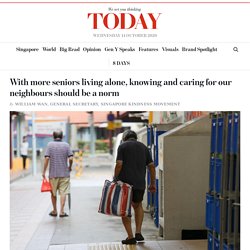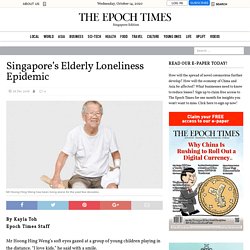

Coronavirus: Elderly hit hard by social isolation amid circuit breaker measures, Health News. A needle and the television set - these two objects have been keeping 83-year-old Nellie Woo company from morning to night for the past week while she is holed up alone at home. She used to enjoy playing bingo and exercising with her elderly neighbours at the Senior Activity Centre (SAC) downstairs, as well as chatting with volunteers who visited her studio flat. Now that all activities for seniors - including home visits - have ceased due to strict circuit breaker measures, Madam Woo is feeling lonely and emotionally down. She thinks about suicide sometimes, and has spent so much time staring at her patchwork and TV lately that her doctor had to give her antibiotics for dry eyes.
For such elderly people, the ills that come with social isolation pose a significant health risk, say some seniors and social workers. Seniors felt less socially satisfied, more isolated during Covid-19 circuit breaker period: Survey, Singapore News. SINGAPORE - Social isolation during the circuit breaker period resulted in lower social satisfaction levels for senior citizens, according to results from a monthly survey of about 7,500 people aged between 55 and 75 here.
Social satisfaction levels dipped by about 4 per cent in May when compared with data from January. In particular, for senior citizens living with others, satisfaction levels fell to the pre-circuit breaker levels of peers living alone, while those living alone saw even lower satisfaction levels as safe distancing measures made it more difficult to find support from friends and the community. As of July, while satisfaction levels have rebounded after the circuit breaker period, which was from April 7 to June 1, they are not back to the levels they were at before. As Singapore's population ages, the proportion of those who remain single and live alone will increase, said Prof Straughan, a sociologist and former Nominated Member of Parliament.
TODAYonline. I thank Mr Sng Hock Lin for bringing awareness to the plight of aged, lonely hoarders, such as the case of the man found dead among piles of rubbish in his flat.

(“Hoarders need emotional support. Here's how we can help them”, Nov 11) It is worrying that the number of seniors living alone in Singapore is going up. The Department of Statistics estimates that 83,000 elderly persons will be living alone by 2030 as compared to the 47,000 seniors aged 65 and above in 2016. According to the Singapore Longitudinal Ageing Study in 2012 by the National University of Singapore’s Yong Loo Lin School of Medicine, seniors living alone and feeling isolated were twice as likely as their peers to develop depressive symptoms as a result of loneliness. Interaction and emotional support are key to prevent vulnerable seniors from suffering depression. Neighbours are a natural support group by sheer physical proximity. If we see seniors having difficulty walking or carrying many bags, we can give them a hand. Social isolation and the elderly poor in Singapore.
SINGAPORE: Her one-room flat was a cluttered mess, and Madam Helen Fernandez herself never seemed to bathe, said her neighbours who always saw her in the same set of clothes. When case workers first visited the unkempt and confused elderly widow, they had to rush her to hospital for very high blood pressure – which resulted because she hadn’t been taking her medication and had been missing doctors’ appointments. Since her husband died 17 years ago, Mdm Fernandez had been living alone with no friends or family – and slowly falling prey to loneliness and dementia. There were times when she’d even call up the police just to talk.
It was how her case got referred to the Social Service Office, and then to case worker Ahmala Rajoo in 2015. “She was receiving financial assistance, about S$500 a month,” said Ms Ahmala, a care executive with NTUC Health Cluster Support in Bukit Merah. But the neatly-groomed Mdm Fernandez you meet today almost doesn’t seem the same person. “Her memory has worsened. Singapore’s Elderly Loneliness Epidemic. By Kayla Toh Epoch Times Staff Mr Hoong Hing Weng’s soft eyes gazed at a group of young children playing in the distance.

“I love kids,” he said with a smile. Wearing a plain white T-shirt and brown shorts, Mr Hoong, 82, has been living in Chinatown most of his life – alone. He has no children. He divorced his wife in 1973, after a 10-year marriage. Like Mr Hoong, the number of seniors (aged 65 and above) living alone has tripled – from 14,500 in 2000 to 42,100 in 2014. The increasing prevalence of solo elderly households is due to a plethora of factors: Singapore’s ageing population, small family structures as a result of the low birth rate, divorce, or the breakdown of family relationships. Like most of the elderly in Chinatown, Mr Hoong spends the twilight of his life going for walks, sleeping, and chatting with people in the neighbourhood. Mr Hoong previously worked as a crane operator and driver until his retirement in his 60s.
Related.